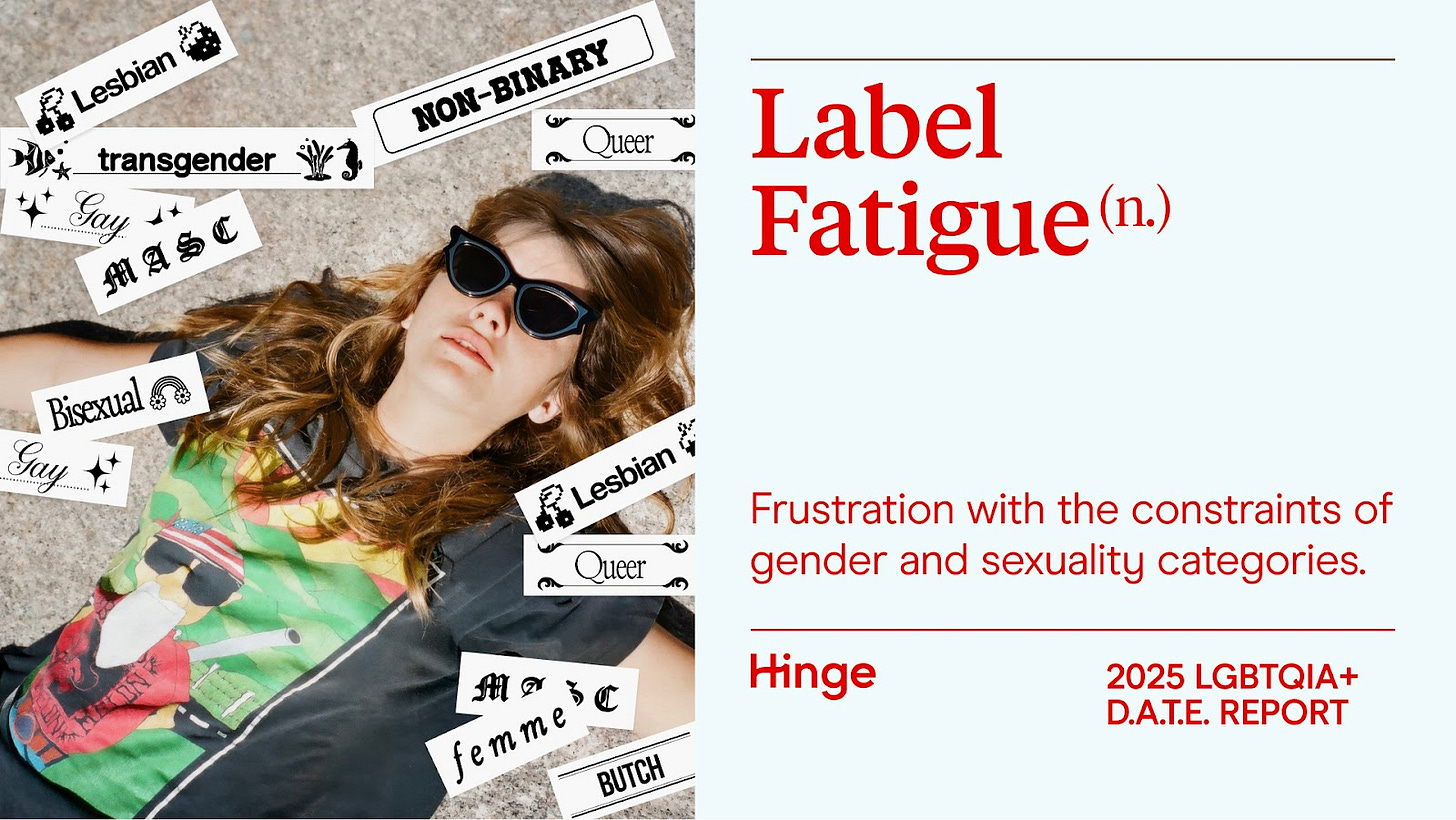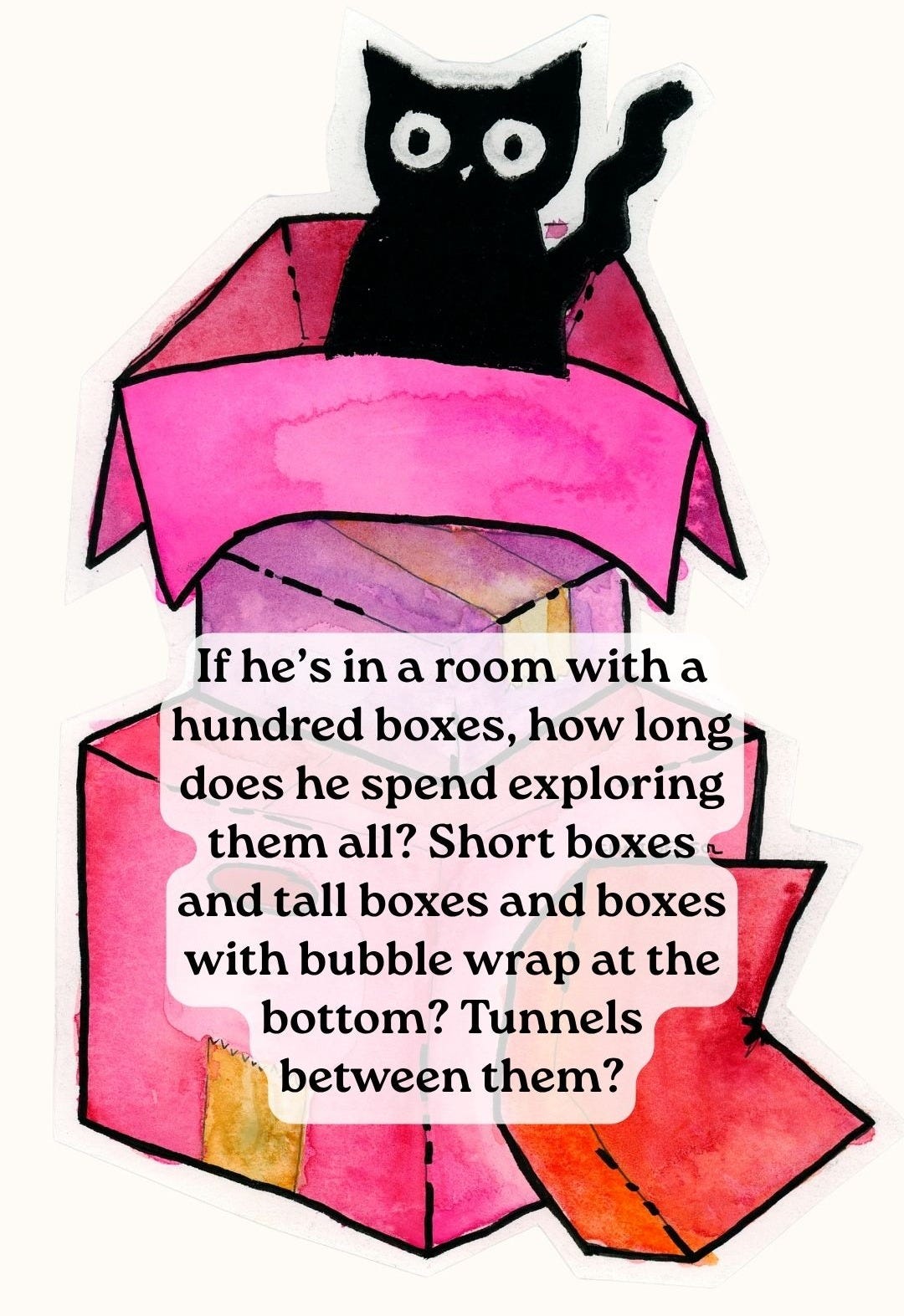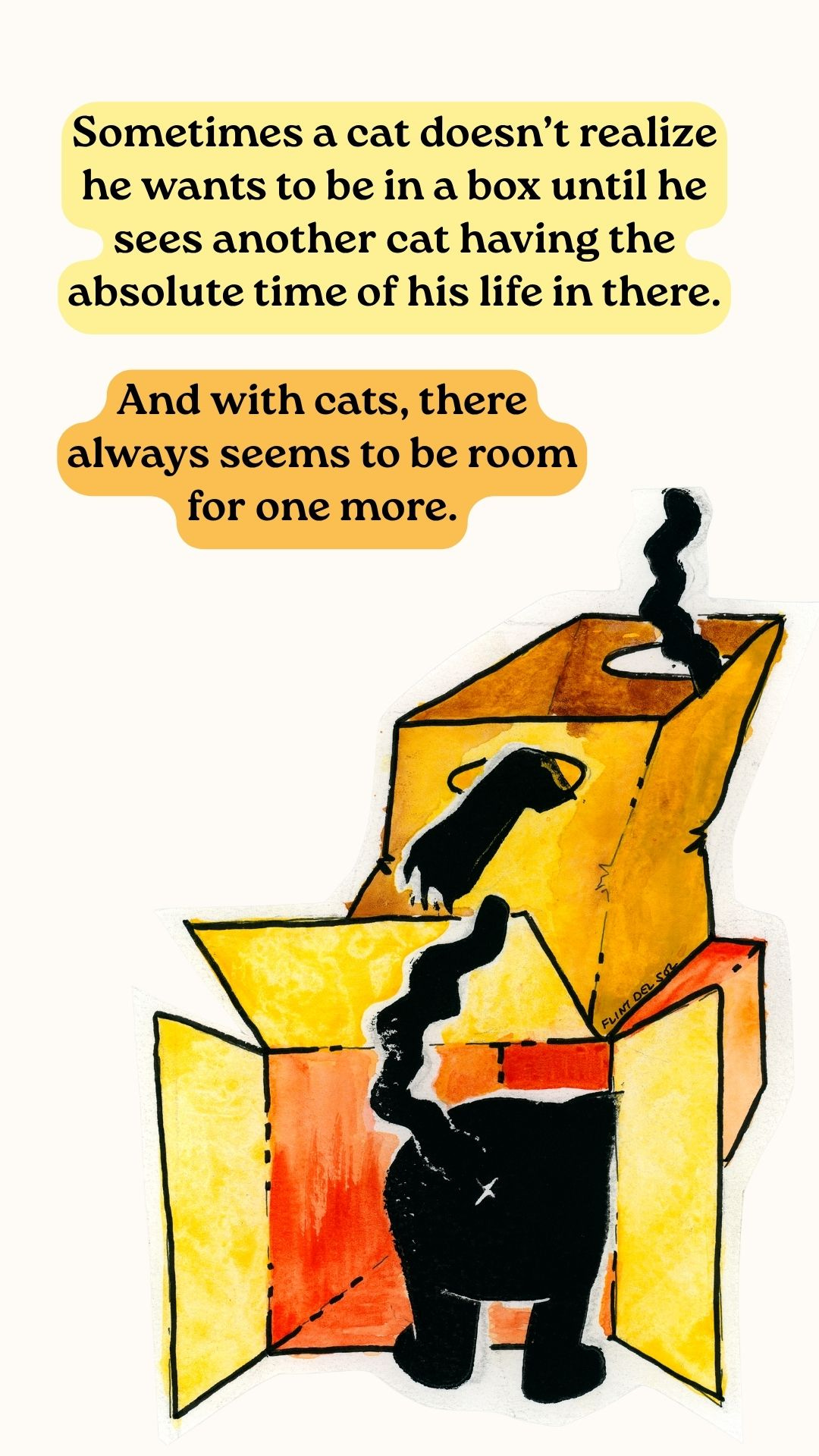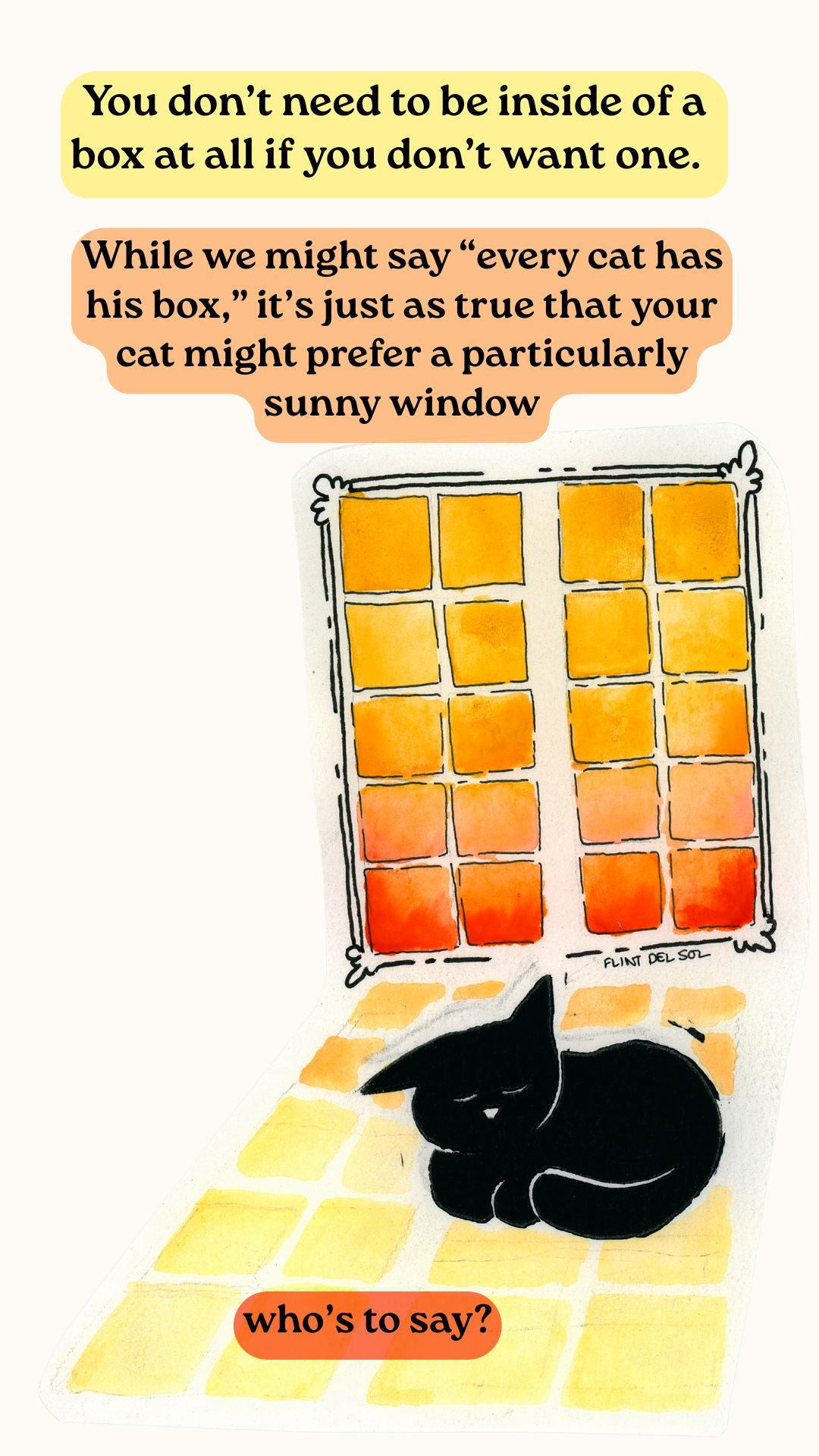You’re just a gay cat in a box, actually
How queer self-sabotage and “label fatigue” keep us from finding ourselves and each other
This is an article sponsored by Hinge (slay, we love a brand keeping my lights on this month #hingepartner), in which I tell you right away that my soulmate and I did not meet on a dating app.
The genesis of our love story was a classic storybook romance: my ex wife was supposed to be his wedding photographer until he broke his engagement, moved to California, and met me in person for the first time at a clothing optional Korean spa. Short of that extremely specific set of circumstances, the chances of us meeting would have been close to zero. This is because I, like many queer people, have been playing whack-a-mole with the words I use to describe my identity for more than a decade. Over the course of my inner quest for understanding, I’ve been heterosexual, cisgender, bisexual, pansexual, nonbinary, lesbian, trans, and gay– there was even a brief period where I was pretty sure I had transcended beyond sexuality and gender entirely. We’re way past a queer BINGO at this point and are hovering dangerously close to a blackout. The identity syzygy I would have had to manifest in order to accidentally bump into the love of my life on a dating platform? When he, a queer trans man, was going through the same rolodex of labels at the same time? It would have required a level of flexibility in our understanding of ourselves that a lot of people find exceptionally challenging.
I let my need for complete self understanding and categorization keep me from really knowing myself for a long time, and I almost let it keep me from a life with the man I married.
We want to know ourselves, yes, and labels can help, but it’s important to think about who put us there, and why.
Let me explain:
Imagine you are a cat beside a box. If you’ve ever been anywhere near a cat, you know that the worst way to get that cat in that box is to try and pick him up and stick him inside. The cat has to REALLY WANT to be in that box, and once he’s in there, it will be equally challenging to get him out.
This is you. You’re the gay cat in a box.
It’s why it can feel so deeply upsetting to try and find the exact right word to describe the multidimensional galactic person and lover that is you in a drop down menu of options, or why the guy who told me more than a decade ago that I might be a trans man got a scoff and an “absolutely not” in return. We are cats, and we really REALLY don’t like when someone picks us up and tries to put us in a box.
This is ultimately the crux of Hinge’s new LGBTQIA+ D.A.T.E report, which found that almost half of queer daters are experiencing something they’re calling “label fatigue:” that nagging feeling that there is something profoundly limiting about staying inside the walls of a box you might not have even asked for.
They did this survey for het-identifying daters as well, and we’re learning that it’s really all of us that are super over it.
How many of us would identify as some flavor of queer if we didn’t feel limited by a prescription we had filled way before we had the chance to explore the intricacies of our inner world? If we didn’t feel that we had to prove something to other people? Or even to ourselves?
Let’s go back to that cat again.
If he’s in a room with a hundred boxes, how long does he spend exploring them all? Short boxes and tall boxes and boxes with bubble wrap at the bottom? Tunnels between them?
Sometimes a cat doesn’t realize he wants to be in a box until he sees another cat having the absolute time of his life in there. And with cats, there always seems to be room for one more.
I think about a conversation I just had with a close friend who is on their own identity journey right now, who sat across from me at a backwoods country bar and tried to explain why they didn’t know if they should come along on a group trip to a queer art exhibit. After some prodding, they admitted that because they were still figuring out their own identity, they didn’t know if they were “queer enough” to be included.
Like friend, buddy, pal, bestie – there is nothing more queer than not knowing if you’re “queer enough.” The journey is sort of the point here.
This was some more data from that Hinge report that really stuck with me: of all of the people surveyed (queer and not queer alike), a THIRD of all of them wanted to date outside of their “box,” but more than HALF of those people didn’t go for it. They doubted their feelings, worried about not understanding the world of queer dating, or feared the person they were into might reject them. More than half!
And what sparked their interest in the first place? What encouraged these people to peek over the edge of their box into the romantic possibilities on the other side?
It wasn’t just because they met someone funny or smart or super duper hot – for 80% of those people, it was energy. They could feel that something was right about this new potential connection. They’d picked a box for themselves, but the walls around them were no match for a good vibe.
And that’s it – so much of what makes us who we are is undefinable.
And while it truly sucks that for so much of our lives we are being hustled between boxes by grabbing hands who want to define our own realities for us, it’s critical to remember that all of these words are made up. These categories – these boxes – are only as real as we decide they are.
And yeah, I’m ignoring something pretty important, which is that we don’t actually live in a cosmic vacuum. The words we use to define ourselves are important, just not in the way so many of us think.
In the not-exceptionally-evolved world as it stands today, our labels hold a considerable amount of social and political weight. Being trans, for example, matters. When I fill out a form in my doctor’s office, or in a healthcare needs survey, I can’t just transcend my labels and write “I reject your limited thinking” under “gender.” I mean, I could, but I would be ignoring how important it is to show up and be counted as a trans person in a world that is trying very hard to erase us. This is true for sexuality as well. As someone who worked in both public education and public health, I know how much state and local (not so much federal) funding for threatened groups is tied to us checking the “right” box.
And historically, these labels have been much more a political identity than a sexual one. I struggled for a very long time to let go of seeing myself as a lesbian, because the community and history wrapped up in that identity made me feel seen in a way I couldn’t square with the gender I was actually experiencing inside of my mind and body.
For this reason, the way I talk about myself has gotten pretty complicated. Even pronouns, the part of speech that most inexplicably infuriates and terrifies so many people who fell asleep during English class, have become a weird margin of my expression that I don’t really know how to explain to people. How do you say “Yes, I know I look like a guy to you, but I think of my pronouns as ‘externally he, internally they, and historically she’?”
My box has changed, and it doesn’t look quite like anyone else’s, but this also doesn’t mean that my box needs to follow me in every part of my life.
Labels can help us notice patterns in our lives, and to find the people who have a better chance of understanding the way we experience the world, but we don’t have to sabotage ourselves with them. Remember, being queer is much more a union than it is a country club. We have a lot to gain from distancing ourselves from “all or nothing” thinking, and to find room for each other.
Ultimately, the most important question is: do the words you use to describe your identity give you better access to self compassion, or not?
Because you don’t need to be inside of a box at all if you don’t want one. Not every cat needs to spend years jumping from one to another, waiting to find the exact right fit. You don’t even need one at all. While we might say “every cat has his box,” it’s just as true that your cat might prefer a particularly sunny window– who’s to say?










Just need to say kudos for breaking out ‘syzygy’ casually like that 💅🏻
I am queer/bi/pan, but mostly tired. Gender gives me a headache. Can I be a cat?